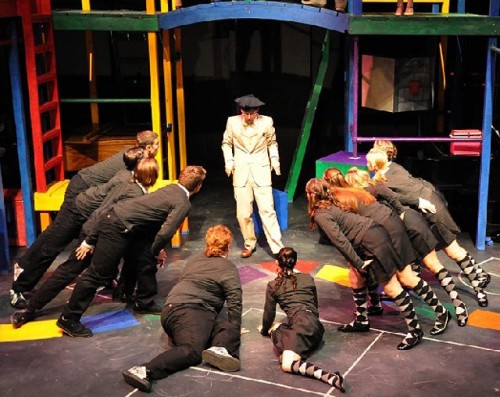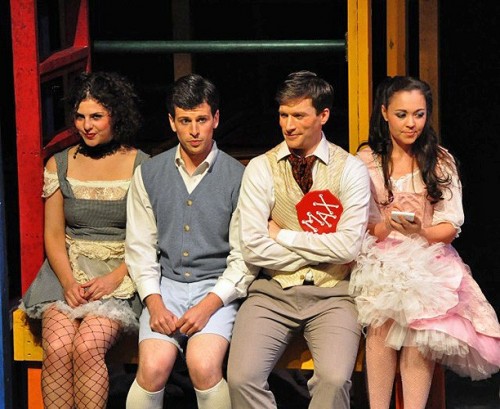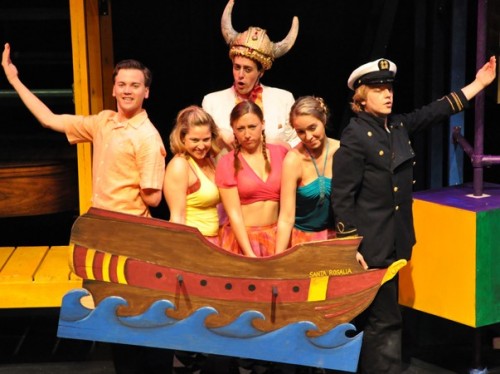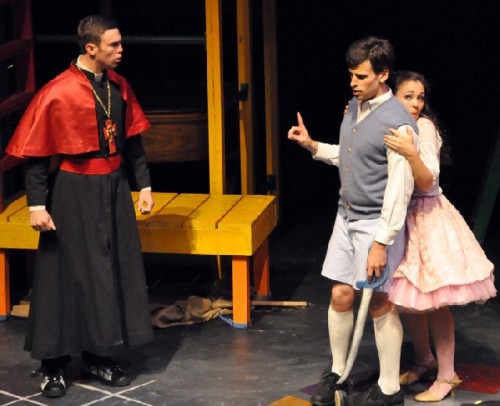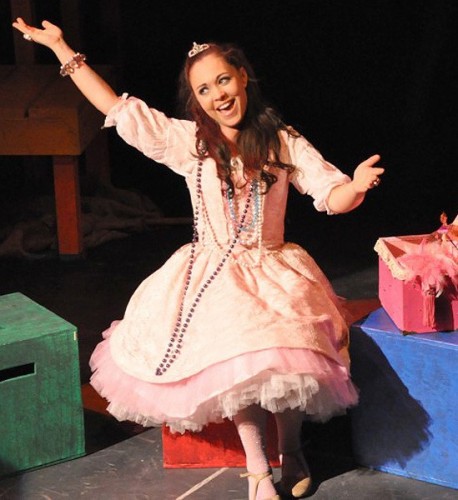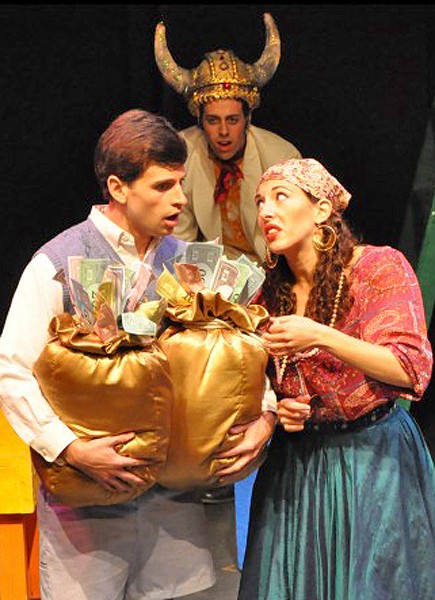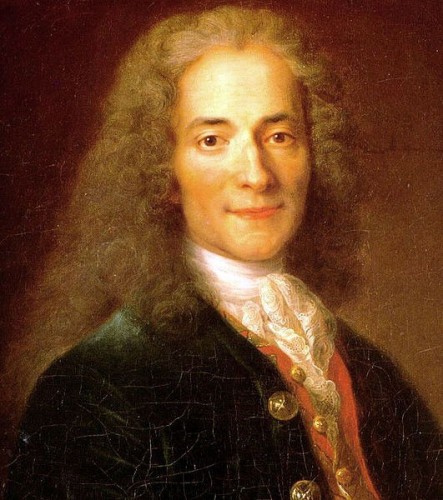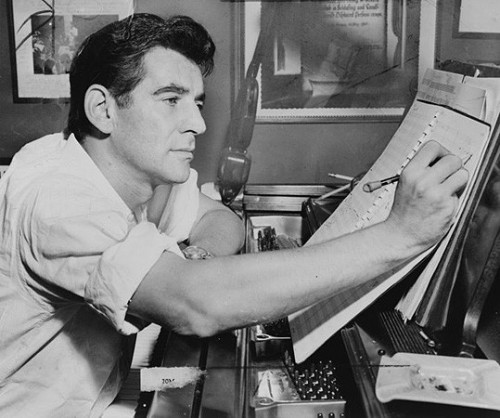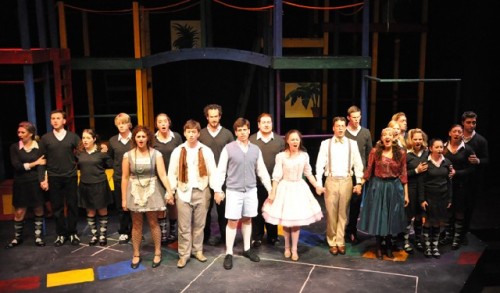A Madcap Candide at Berkshire Theatre Festival
Leonard Bernstein Musical Sparkles in Stockbridge
By: Larry Murray - Jul 14, 2009
Candide, Music by Leonard Bernstein, Book Adapted from Voltaire by Hugh Wheeler, Lyrics by Richard Wilbur, With Additional lyrics by Stephen Sondheim and John LaTouche, Produced on Broadway by The Chelsea Theatre Center of Brooklyn in conjunction with Harold Prince and Ruth Mitchell, Broadway Productions Conceived and Directed by Harold Prince, Directed by Ralph Petillo, Musical Direction by Matthew Stern. Jae Han - Accompanist, Stage Manager - Sarah Garrett, Scenic Designer - Erin Kiernan, Costume Designer - Jessica Risser-Milne, Lighting Designer - Jaime Davidson, Sound Designer - Janie Bullard, Dance Consultant - Rachel Plaine, Associate Director - Travis Daly, Associate Lighting Designer - Christopher Staebell.
The Unicorn Company: Michael Brahce - Man #1, Julia Broder - The Old Woman, McCaela Donovan - Cunegonde, Robert McFadyen - Man #2, Samantha Richert - Woman #1, Ben Rosenblatt - Dr. Pangloss, Kyle Schaefer - Maximillian, Matthew Stern - The Governor, Becky Webber - Paquette, Julian Whitley - Candide. Ensemble: Elizabeth Ard, Rachel Copel, Devin Doyle, Melissa Dvozenja, Arne Gjelten, Anna Koehler, Miles Rice, Stephen Rowland, Maximilian Schadler, Melanie Siegel, Jacyn Walsh. About two hours, fifteen minutes with one intermission. At Berkshire Theatre Festival Unicorn Theatre, Stockbridge, MA. July 7 - August 15, 2009.
The story of Leonard Bernstein's Candide is one of chance, much like paper, scissors, rock. Candide was created at the same time he was working on West Side Story, and made its initial debut in 1956 with Lillian Hellman setting pen to paper for the book. The critics threw rocks at it. It had a revival directed by Hal Prince with major changes in 1973 - the Hellman book was thrown out and replaced by one credited to Richard Wilbur while scissors were taken to Bernstein's score, cutting it back substantially. In 1982 it saw more changes as it entered the repertory of the New York City Opera. Another Broadway revival was undertaken in 1997, expanding the music to include much that was cut in 1973. It's easy to love Candide, but there are endless discussions as to which one is the best.
I saw the first version from the last row of the balcony of the Martin Beck Theatre in New York as a teenager, the second sitting on stage at the Broadway Theatre on an uncomfortable padded nail keg seat when I was thirty-something, and last night, at the Berkshire Theatre Festival, I finally saw the best version of all. This time it was from some nice and comfortable seats in their intimate Unicorn Theatre. The BTF Candide was a blend of all the previous versions, with fresh twists of their own. At its heart, Candide is a love story drawn from the book by François-Marie Arouet (1694 – 1778), better known by his pen name Voltaire. He was a French Enlightenment writer, essayist, and philosopher known equally for his wit and his defense of civil liberties, especially freedom of religion and speech. Voltaire is the original author of "If God did not exist, it would be necessary to invent Him."
This musical takes place all over the not-so civilized world landing Candide and his love in the middle of the Spanish Inquisition, the Seven Year's War and the 1755 Lisbon earthquake. The incidents are each drawn from Voltaire's original book and recreated on stage during the course of this production. Not sure what to call it. Is it a musical comedy? An operetta? In some sections it's closer to Gilbert and Sullivan. At other times it is more of a farce with music. This might even be called Candide meets Saturday Night Live. The humor is totally topical and up to date, though the words are centuries old. Created ten years before Rowan and Martin's Laugh-In took America's television viewers by storm, you can see the seeds of the future. Rapid fire jokes, running gags, non-sequitors, the spoofing of the high and mighty are all there. It is amazing to see how well Voltaire's magnum opus and Bernstein's adaptation of it has withstood the ravages of time.
The BTF production was conceived by director Ralph Petillo, and his creative team gave it a contemporary treatment. The set is a colorful jungle gym which symbolizes both the playfulness of the cast and its energetic youth. They are made up of members from the BTF Apprentice Company and also from Brandeis University. Young, but experienced, this is a group of seasoned young actors. Each and every one has impressive resumes and experience, and their professionalism shines on stage. The blocking and choreography never stops moving, up, down and around the playground set, and spills over the lip of the stage and up the aisles ultimately embracing the audience in its irresistible tale.
Cleverly tucked into the set are two baby grand pianos, making the fusion of music and lyrics positively organic. Music director Matthew Stern and Accompanist Jae Han create a great foundation upon which the performers depend.. The pianos are on loan from local guest houses which deserve praise for their generosity.
Being Bernstein, some of the music is almost operatic in range and demand well trained vocalists. McCaela Donovan was given the challenge of mastering "Glitter and Be Gay," a coloratura challenge for a pop singing music theatre person and she more than pulled it off, bringing applause and cheers for her star turn. "It took me three weeks to learn that one," she commented at the talk back after the show. Glitter is the one song that has achieved some degree of popularity, and was used as the theme for the old Dick Cavett Show. It is also a concert favorite for opera stars doing "pop" night turns.
As our hero Candide, Julian Whitley's superb tenor enabled him to infuse the role with gorgeous singing. Operatically trained, the voice was special since Bernstein did not write this for a traditional tenor, but for one that requires quite a few lower notes as well. The one drawback is all that opera training was on display, with its demands for perfect vowels distorting his acting face as he sang. His vocal teacher has to be proud, but his acting teacher would undoubtedly have him modify those round "pure" and "diphthong" vowels into less operatic ones.
Julia Broder delighted the audience as The Old Woman. She demonstrated a delightful comic sense of timing and delivery. There were no minor roles in the cast. Everyone got to play several different characters, and everyone was center stage at one time or another during the performance. All excelled. The ensemble had several sections of fortissimo singing, and they were moments to treasure, with a volume that probably carried all the way across the parking lot to Route 7. And there were moments of sublime beauty as well, as in the churchly choral interludes. Bravo, everyone.
In the original Broadway Candide, Lillian Hellman drew a clear boundary establishing that the story did not belong to the present. She softened and watered down Voltaire. It was like taking the hot sauce, lime and cilantro out of Mexican food. I am happy to report that BTF has returned all the spice to this production.
The traditional fourth wall between actors and audience is also gone as the action easily reaches out and into the audience several times during the evening.
In terms of costumes, the people on stage look like regular people for the most part. Using modern dress and attitudes while remaining true to historical underpinnings must have been a challenge to work out theatrically. But we are the better for it. The show drips with insouciant irony and meaningful metaphors, the best of which occur during the Inquisitional song, Auto De Fe.
In Candide, Dr. Pangloss reminds his students that "This is the best of all possible worlds" even as everything bad that could happen, indeed does happen. Candide pursues and rescues Cunegonde all through the old world and the new, from Westphalia and Spain to South America and back. It is a world in which everyone smiles and pretends all is going to end well and it never does. Sort of like checking the latest news on tv.
Reality is caricatured in a tone that is mordantly matter-of-fact . "You must be hanged" is followed by a hanging. But the victim turns out not to be dead after all. These reality shifts are intended to remove any verisimilitude the story might have. But who cares. Realism isn't the point, satire is. Candide ridicules all religions, all governments, all war and all philosophy through scathing allegory. Its words pose as respectable, but craftily hidden under Candide's thin veil of naïveté are the real truths about human nature, love and kindness. It may be tough medicine but that spoon full of sugar sure helps it go down easily.
Served up as a bubbly concoction on the Unicorn Stage, the Berkshire Theatre Festival's Candide is just good fun, not a lesson in philosophy. Whether you've never seen Candide before, or seen it in other interpretations, this is the version you should see, whether for the first time or the fifth. This tasty treat is the one with a cherry on top.
Candide is being performed through August 15 on Mondays, Tuesdays, and Thursdays through Saturdays at 8pm, Wednesday at 7pm, with matinees on Thursdays and Saturdays at 2pm. For more information and tickets visit www.berkshiretheatre.org or call the Festival Box Office at 413.298.5576.

